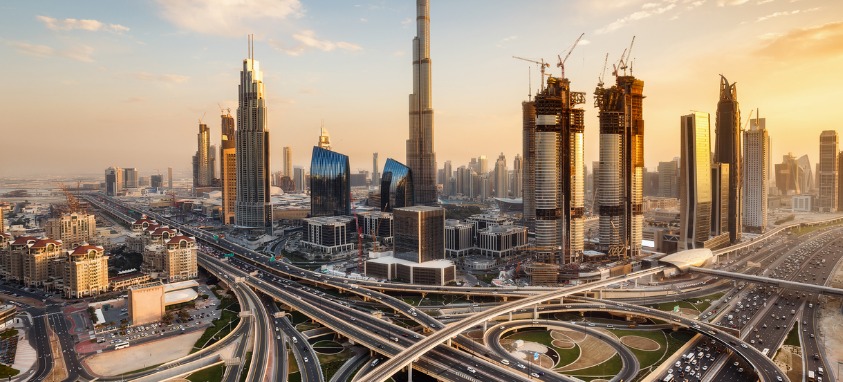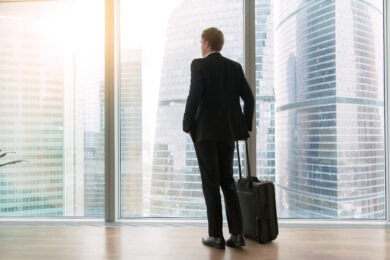It models a futuristic utopia. Sleek, avant-garde hotels kiss its sky and exude geometric elegance. Inside them, robot butlers take your luggage and your phone unlocks your hotel room. It’s Dubai—a growing powerhouse in the hospitality industry that generated over $18 trillion in 2017.
It Started with a Vision
In 2012, Dubai welcomed 10 million visitors. In May of 2013, the government announced a Dubai 2020 vision to double that number in celebration of the nation’s 50th anniversary. The plan includes a strategic marketing approach to convert awareness to bookings, as well as an increase in tourism destinations.
The city is on track to fulfill the vision. In 2017, nearly 16 million people came to indulge in the city, a 6.2 percent increase from the year before. Room inventory is predicted to climb to 132,000 by the end of 2019.
“The evolution of Dubai’s hotel sector has played an important role in underpinning the city’s growth as a business and tourism destination, and amid this there is an increased focus on the midscale segment of the market,” Steen Jakobsen, Dubai Business Events director says. “Driven by incentives for developers in recent years, this has resulted in a push for diversity of hospitality offerings, meaning that business travelers and planners have a wide range of options to choose from at different price points.”
Hotel Heaven
Some buildings serve as cultural icons, such as the Burj Khalifa, the tallest building in the world that is home to the opulent Armani Hotel Dubai. The hotel’s five meeting spaces are decked out in black and white amenities and ooze sophistication. Combined, the rooms accommodate more than 1,500 people.
Many luxury hotel chains are also showing up to the planning party.
AccorHotels announced a SO/ property to be built in Uptown Dubai. The imaginative building will model a kaleidoscope and vibrantly reflect the city. A press release promises a “reimagined” meeting space with a unique pre-function space for events and meetings.
The manmade Bluewaters Island in Dubai will become home to two of Caesar’s first non-gaming resorts. Caesar’s partnered with Meraas Holding for the project. Combined, the five-star resorts will offer almost 500 guests rooms and a wellness space specifically for meetings and conventions.
“We are creating unique experiences and leveraging strategic partnerships to showcase the best of what Dubai can offer to its visitors,” His Excellency Abdulla Al Habbai, group chairman of Meraas, said in a press release.
A Jetson’s state-of-mind has interwoven itself into hotel plans. Dubai’s industry continues to experiment with futuristic technology, such as wireless charging tables.
Getting Down to Business…
Luxury event venues aren’t limited to hotels. The Dubai World Trade Centre is the region’s largest events site. It boasts 1.3 million square feet of space, and is conveniently located three miles from Dubai International Airport.
A heavy stream of professional events is in the pipeline. Jakobsen says 2017 was Dubai Business Events’ most successful year. The convention bureau won 212 event bids and proposals. It’s a move with an anticipated economic impact of more than $194 billion in addition to the impact from a full pre-existing calendar of annual events.
Jakobsen adds that with a diversity of events and venues, the city can accommodate groups of all sizes.
…And Pleasure
Dubai isn’t just a diverse city for meetings. It’s a prime cut for team building and leisure activities as well.
“The city has plenty to offer, from a spread of world-class, action-packed theme parks, to impeccable beaches and resorts, while its malls are fitted with indoor ski slopes, large-sized aquariums and more,” Jakobsen says.
The Dubai Eye (Ain Dubai) is set to open later this year. Standing at nearly 689 feet tall, it will be the world’s largest observation deck.
Michelin-starred chefs and street food have combined to turn Dubai into a foodie destination with quality cuisine across the board. Famous chefs, such as Gordon Ramsay and David Myers have opened properties at Atlantis The Palm and Renaissance Downtown Hotel respectively.
“As a melting pot of over 200 nationalities, Dubai has cuisines from around the globe, meaning there are options for every taste, and visitors and groups can do a food tour of the world in one city,” Jakobsen adds.
Cruisin’ Easily
Dubai’s blend of cultures and tourism numbers can be attributed to its accessible location. Two-thirds of the world’s population lives within a four-hour flight of the city. Dubai International Airport (DBI) serves more than 90 airlines and welcomed more than 80 million passengers in 2017.
The airport has also embraced the ease technology can bring. Over 100 smart gates are available at DBI, allowing passengers to get through security in as little as 10 seconds. A reader scans your passport, fingerprint and iris and then sends you through.
A recent partnership with Virgin Hyperloop One could set the city further ahead of the transport game. Hyperloop is a suspended vacuum tube that could transport passengers and cargo at speeds of up to 745 mph. There is speculation on a route from Dubai to Abu Dhabi that would turn a 90-minute drive into a 12-minute commute. The system is forecasted to be fully functional by 2021.
The Future is Bright
Dubai awaits an even greater influx of travelers after it hosts World Expo 2020: a showcase of the greatest technologies and inventions that occurs every five years. The city expects more than 25 million visitors during the six months the Expo runs, with 70 percent traveling from outside the United Arab Emirates. In consequence, the hospitality sector is running full speed ahead with new developments to accommodate them all.
Jakobsen notes that the industry, however, is also building for long-term sustainability. Eighty percent of the host site will be repurposed.
“As the city enters the next phase of preparations for Expo 2020 Dubai, we’ve already seen a growing interest from businesses, conference organizers and meeting planners in the event, its theme of ‘Connecting Minds, Creating the Future’ and how they can seamlessly fit within this synergistic business eco-system that’s being built to host the world,” Jakobsen says.




